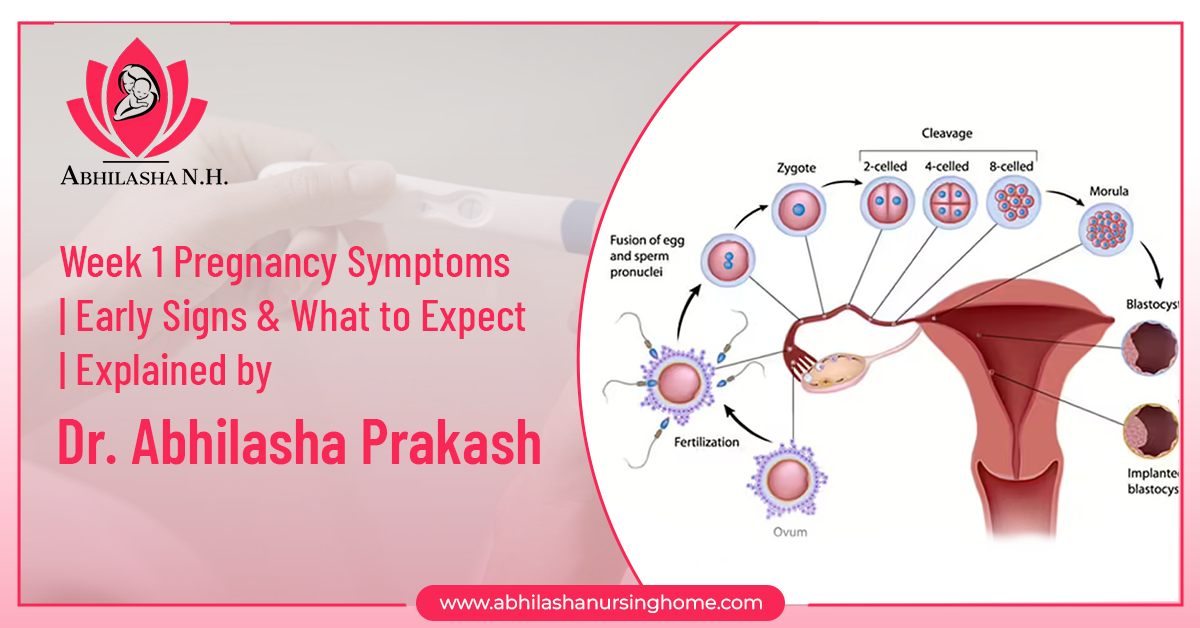At 1 week pregnant, you are actually not pregnant yet. Doctors count pregnancy from the first day of your last period to help calculate your due date. This week, your body is removing the old uterus lining through periods and getting ready to release a new egg. Fertilization (when sperm meets egg) has not happened yet.
Even though you are not pregnant now, it is a good time to take care of your health. Start eating healthy food, avoid smoking and alcohol, and begin taking folic acid. This will help your body be ready for pregnancy.
Knowing about this time helps you understand your cycle better. If you are planning for a baby, this is the first step of your pregnancy journey. Week 1 is like the preparation phase for the baby to come in the next weeks.
1 Week Pregnant: Overview
| Topic | Details |
| Week of Pregnancy | 1st Week (Counted from the first day of your last period) |
| What’s Happening | Your periods are going on; body is cleaning old lining and preparing for new egg |
| Baby’s Development | Baby not formed yet – this is the body’s preparation stage |
| Size of Baby | No baby yet – fertilization hasn’t happened |
| Symptoms | Normal period symptoms like cramps, tiredness, mood changes |
| Pregnancy Test? | Too early – test will show negative. Consult with your Obstetrician-Gynecologist |
| Hormones | Estrogen and progesterone working to prepare for ovulation |
| Is it safe to take medicine? | Take only doctor-approved medicines. Avoid self-medication |
| Diet Tips | Start folic acid, eat fruits, vegetables, and drink enough water |
| Things to Avoid | Smoking, alcohol, junk food, stress, and too much caffeine |
| Doctor Visit Needed? | Not needed right now, but plan for future check-up if trying for pregnancy |
| Emotional Changes | Some women feel low energy or mood swings during periods |
| Important Advice | Keep your body and mind healthy, rest well, and start healthy habits |
1 Week Pregnancy FAQs:
Q 1: Can 1 week pregnant cause stomach pain?
Ans: Yes, mild stomach pain at 1 week pregnant is usually normal and not a cause for concern. It can happen due to the fertilized egg implanting in the uterus, causing light cramping similar to menstrual pain. Hormonal changes, gas, or early uterine expansion may also contribute to the discomfort. The pain is typically mild and short-lived. However, if the pain is severe, persistent, or comes with unusual symptoms like heavy bleeding, it’s best to consult a doctor.
Q 2: What is urinary tract infection?
Ans: A urinary tract infection (UTI) during 1-week pregnancy refers to an infection in the urinary system, commonly affecting the bladder or urethra. While you’re not technically pregnant yet in week 1 (it’s counted from the last menstrual period), UTIs can still occur around this time and may continue into early pregnancy.
Symptoms may include:
- Burning sensation during urination
- Frequent or urgent need to urinate
- Cloudy or strong-smelling urine
- Lower abdominal or back pain
- Blood in the urine
UTIs are usually caused by bacteria entering the urinary tract. Women are more prone to them due to a shorter urethra. If you’re trying to conceive or may be in early pregnancy, it’s important to treat UTIs early to avoid complications. Always consult a doctor if symptoms appear.
Q 3: Can you feel hungry at 1 week pregnant?
Ans: Yes, it’s possible to feel hungry at 1 week pregnant, although it’s not a guaranteed symptom. While increased hunger is a common early sign of pregnancy, it can vary from person to person. Some may experience cravings, while others might notice a reduced appetite due to early hormonal changes or mild nausea.
Q 4: Can I Get Pregnant 1 Week Before My Period?
Ans: Yes, but it’s unlikely. Ovulation usually happens 10–16 days before your next period. Sperm can live for up to 5 days, so if you have an irregular cycle or late ovulation, pregnancy is still possible though rare.
Q 5: Can You Tell You’re Pregnant After 1 Week?
Ans: At 1 week after conception (or ~3 weeks pregnant by medical standards), most women won’t feel symptoms yet. However, subtle signs like breast tenderness or mild fatigue may start. A pregnancy test likely won’t detect it yet, wait until after your missed period.
Q 6: How Do You Feel When You’re 1 Week Pregnant?
Ans: Most women feel no changes during the first week after conception. Some report mild cramping, bloating, or emotional swings, but these are also common PMS symptoms.
Q 7: How Many Weeks is 1 Month Pregnant?
Ans: 1 month pregnant = about 4–5 weeks. Pregnancy is counted from the first day of your last period, not from conception.
Q 8: Can I Get Pregnant 1 Week After My Period?
Ans: Yes, especially if you have a short cycle (e.g., 21–24 days). You may ovulate earlier than expected, and sperm can survive up to 5 days, increasing chances of conception.
Q 9: Am I 1 Week Pregnant?
Ans: Early signs may include sore breasts, fatigue, mood swings, and light spotting. Take a pregnancy test after your missed period for accurate results.
Q 10: How to Know If Pregnant in 1 Week?
Ans: Look for early signs: sore breasts, bloating, light cramping, nausea. But symptoms can vary or be absent. Testing too early may give false negatives.
Q 11: How to Not Get Pregnant After 1 Week (Post-Intercourse)?
Ans: If you’ve had unprotected sex and don’t want to get pregnant, emergency contraception (within 72–120 hours) may help. Consult a doctor immediately.
Q 12: What Does “1–2 Weeks Pregnant” Mean?
Ans: This means you’re 3–4 weeks pregnant by medical definition. Week 1 and 2 are counted even before ovulation. It’s a common notation on pregnancy test kits.
Q 13: Can You Feel 1 Week Pregnant? / How Does Your Stomach Feel?
Ans: Generally, no. You may feel normal or slightly bloated. It’s too early for physical signs like a baby bump or noticeable stomach change.

